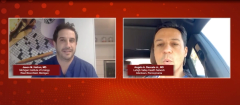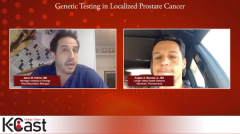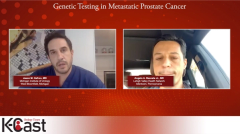
Germline Mutations & the 2-Hit Theory in Prostate Cancer
Angelo A. Baccala Jr., MD: Welcome to this KCast program titled “Genetic Testing in Prostate Cancer.” I’m Dr Angelo Baccala from the Lehigh Valley Health Network in Allentown, Pennsylvania. Our discussion today is going to focus on current standards of care and future opportunities to help men with prostate cancer. Joining me in this discussion is my colleague Dr Jason Hafron, from the Michigan Institute of Urology. Welcome, Jason. Let’s begin.
Jason M. Hafron, MD: Thanks, Angelo. Good to see you.
Angelo A. Baccala Jr., MD: Likewise. Obviously, the genetic world of prostate cancer is rapidly evolving, and a lot of things are happening with the fundamentals of genetics. We’re learning a lot about that as we go along. It’s kind of a new field for a lot of urologists. It would be good, just by introduction, to talk a little about germline mutations vs somatic mutations. Jason, what are your thoughts on that? Do you want to explain a little to those listening and reading what germline mutations are?
Jason M. Hafron, MD: I agree, Angelo. Genetics is becoming a more and more important part of management of prostate cancer. It’s important for urologists to understand basic genetics because it can have a significant impact on prostate cancer progression and disease management, from diagnosis to late-stage disease. We are finally entering this very exciting era of personalized medicine, where identification of a mutation may impact local treatment, the decision whether to do active surveillance or active therapy, and in the late stages of disease, the choice of systemic therapy.
As we realize the importance of genetics and germline mutations, we need to understand it. It goes back to high school biology, but most of us have forgotten more than we know today, so we’ve got to revisit this and understand it. A germline mutation is a mutation that’s basically acquired from your mother and your father. They’re inherited pathogenic variants, and they’re present in all cells of the body. That’s key: that they’re in all cells of the body and really present at birth. To get a result for a germline mutation, you can get it from saliva or blood. However, somatic mutations are a little different. These mutations are acquired; you’re not born with these. To get the results of a somatic mutation, you have to get the sample from either the primary tumor or, preferably, the metastatic tumor site, and that will give us the somatic mutation.
Angelo A. Baccala Jr., MD: That’s a great way of explaining it. It does get confusing for those of us who learned about it a long time ago and forgot. But as you mentioned, the germline mutation is really noncancerous cells, and somatic mutations are really tumor-acquired mutations—so these mutations happen in the tumor itself after they have cancer. Certainly, they’re used for different things. But the idea that it has to come from both parents is also important when we talk about the 2-hit hypothesis of both alleles being disturbed or being mutated in order to pass on these hereditary conditions. That’s where family and personal history play a big role. Family history of cancer makes you more susceptible because those alleles are going to be passed on. If you have mutations in both sides, you can more likely get it. So that really explains that a lot. That was great.
Jason M. Hafron, MD: The 2-hit hypothesis is important. We all remember it from biology and premedicine. But either it’s a germline mutation that you’re born with and you may acquire a second hit, or you may be born with a susceptible gene and require a second hit either through environmental or some selective pressure. But the 2-hit hypothesis is definitely something to be aware of. It can explain all cancer because, essentially, cancer is a mutation that occurs. The 2-hit hypothesis is very important.
Newsletter
Stay current with the latest urology news and practice-changing insights — sign up now for the essential updates every urologist needs.





